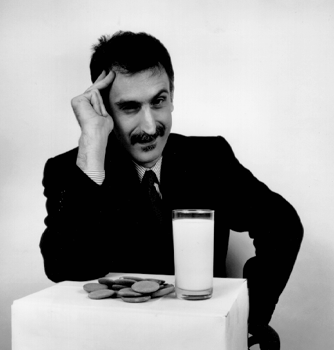

"It's like being a cook. And if you were a really good cook, and you had a lot of money for really excellent ingredients and really good equipment, then you could cook just about anything. But if you don't have all the gear . . . and you don't even own a cookbook, but you still want to eat, and nobody's going to cook it for you, then you better find some other way to improvise that dish. And that's kind of the way the stuff gets put together."
from "Zappa!" magazine; interview by editor Don Menn
Frank Zappa's music and professional career have always suffered as a
victim of society's unwillingness to laugh at its own weaknesses. Satire
is no fun when nobody is spared the whip of Zappa's tongue and the sting
of his fiery, imaginative guitar playing. In 1965, when Zappa and his
group, called The Mothers, were about to release their first LP "Freak
Out" on MGM Records (featuring the song, "Who Are the Brain Police?"),
the label told the group to change its name. "Out of necessity, we became
the Mothers of Invention," Zappa writes in his autobiography, "The Real
Frank Zappa Book," an indispensable tome for anyone interested in the
master's colorful career.
Source: various; cited in body